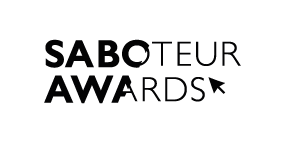Saboteur Awards – The Results
Saboteur Awards
The Saboteur Awards are a new award celebrating literary magazines. Over the last few weeks, a team of volunteer judges have been poring over the shortlist, posting to each other copies of the print magazines, getting angry at the mail and dealing with technical hitches. Whilst the top three became clear early in the discussion process, judges were impressed with many of the other shortlisted magazines. Positives could be found even in the magazines that were described as ‘not being my cup of tea’ (can you tell that the majority of judges were British?) In light of this, we would be happy to provide any of the magazines shortlisted with feedback, should they be interested in the particulars (get in touch at [email protected]).
The magazines that most impressed us were those that had a unity of purpose, in other words a strong, cohesive editorial vision. Their design matched and enhanced their content. We feel that our top three deserve recognition for the contributions they’ve made to the literary world. They are exciting, innovative, fresh, and stretched the boundaries of what we thought literary magazines could achieve.
1st Place: Polarity
Judges were impressed by Polarity’s ambition and praised the range of formal innovations within its pages. They commended its strong editorial and aesthetic vision and deemed the magazine as ‘not just displaying art, but being a piece of art itself, without the form taking away from the content’. The theme of ‘Tax vs Death’ was deemed broad enough to allow inspired approaches, whilst still being a cohesive and echoing thread. The integration of the visual with the textual was seen as a particular success. Finally, as one judge said: ‘Who would have thought that surrealism could feel so…welcoming? […] I could pay no higher compliment to the magazine than to say it has fostered in me a newfound appreciation for surrealism in art/literature.’
2nd Place: >kill author
Judges were all agreed that this was an outstanding magazine that successfully made use of the internet. Whilst conceptual and experimental, the content was still deemed accessible. Judges admired the integration of poetry with prose (and resulting cross pollinations). The slick, minimalist website received high praise; one judge said it was ‘like Jil Sander in website form’. As one judge said: ‘It was one of those things that made me glad that I’m alive now – in the times of the internet, anonymity and internationalist art. It really grasps the spirit of our time for me.’
3rd Place: La Petite Zine
La Petite Zine was deemed a touchstone for experimental poetry in bite-size forms. The content was found to be of high quality with one judge commenting on the ‘brilliant variety of truly potent poems’. The website was admired for being minimalist, clean, functional, yet iconic. In particular, judges appreciated the taglines that led into each poem. La Petite Zine, again, has clearly embraced the internet as a medium, and its multi-platform presence was praised.
Highly Commended for its use of web-integration: Moon Milk Review
A running interest during discussions was whether the magazines fully made use of their chosen medium’s potential. In particular we paid attention to online magazines that attempted to go beyond what a print magazine could achieve. For instance, judges appreciated the integration of recordings/video in Stone Telling (as well as in Goblin Fruit) as an example of added value and accessibility.
However, the magazine that most impressed us in terms of web integration was Moon Milk Review. The magazine was praised for its abundant use of links, giving the impression that it was a fruitful launching pad. As one judge said:
‘that’s what beautiful (and dangerous) about the web – everything links up together and there’s a vast sea of information out there. Most other zines we’ve looked at feel much more insular by comparison, […]linking to other places is something you can’t do in print and as such is very much an advantage of the online form. Moon Milk Review gives us an article you can dig around if you like, or can skim over if you don’t like it.’
The use of YouTube was also appreciated, whilst the Prosetry section was praised for taking advantage of the online platform and reinventing communication between the visual and the textual.
The judges were Anna Bogdanova, Ian Chung, Caroline Crew, Claire Trévien and Richard T. Watson







Pingback: > kill author | Blog | Second Saboteur
Pingback: hanging around // update // oh hello poem: Amy McDaniel’s ‘if you only remember one thing i’m telling you’ « FLOTSAM: A blog of poetry and all sorts
Pingback: MMR Highly Commended in Inaugural Saboteur Awards | Moon Milk Review
Pingback: Saboteur Awards 2012 « Sabotage
Pingback: MMR Highly Commended in Inaugural Saboteur Awards « The Doctor T. J. Eckleburg Review